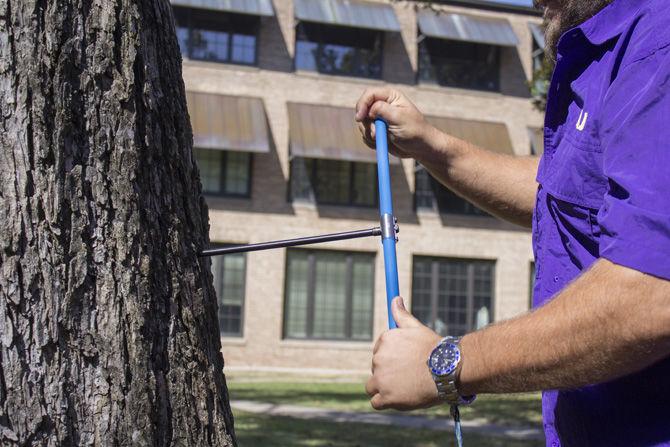Louisiana’s rich culture has always been deeply tied to its landscape, which could be in jeopardy if it continues to disappear at an alarming rate. While the University is directly affected by the problems erosion presents, it could offer a solution.
Geography and anthropology Ph. D. student Clay Tucker is entering his fourth year researching the effects of hurricanes on Louisiana’s gulf coast. Tucker is “a seventh-generation Baton Rougian” and also received his undergraduate and master’s degrees from the University.
Tucker’s research involves using dendrochronology, the study of tree ring-dating, to investigate the impact of hurricanes on coastal environments.
After a hurricane, trees suppress their growth. Through the mapping of tree rings, researchers can assess how resilient they are in times of stress, and, ultimately, how this affects coastal restoration, Tucker said.
“A big scientific discovery in all of this work is that we found trees in a place where we haven’t been able to study ecosystem-climate relationships in the past, and we found that area right along the coastal zone,” Tucker said.
Hurricanes rip the leaves and branches off of trees and bring in lare amounts of salt water, which harms tree growth. The flooding stress is difficult for a tree to overcome, as it wants air just as much as it wants water. The trees aren’t adapted to salt and need substantial amounts of precipitation before they can grow normally again.
The landscape changes occur because of the effects of climate change and sea level rise. Louisiana loses 16 square miles of wetlands each year, which is equivalent to a football field every hour.
Tucker said the best way to combat coastal erosion is to implent a series of small acts across vast locations over a long period of time. Sea level rise is a natural process that is exacerbated by human effects, he said.
“It’s a dynamic landscape where we have to live dynamically if we’re going to live in it,” Tucker said. “I don’t think it’s a hard-set landscape, and we need to recognize that.”
The ecosystem can survive, and when humans do too much, it’s detrimental to the environment, Tucker said. If people were more aware of natural processes, the idea of climate change and landscape change would be easier to fathom.
“There’s not just the anthropogenic, or the human cause of climate change. There’s also a big part of natural climate change that we should be, at the very least, aware of, but in many ways intimidated by,” Tucker said.
Tucker’s father was an outdoorsman, and raised his son as one. Tucker conducts research in the field for about a week each month, and being in the field is what originally drew him to his field.
“I get to do what [my father] did on the weekends all the time, which is pretty cool,” Tucker said.
Doctoral student studies trees to improve coastal restoration efforts
October 2, 2016
Graduate student Clay Tucker demonstrates coring a tree on Friday, Sept. 30, 2016, on LSU campus.
More to Discover











